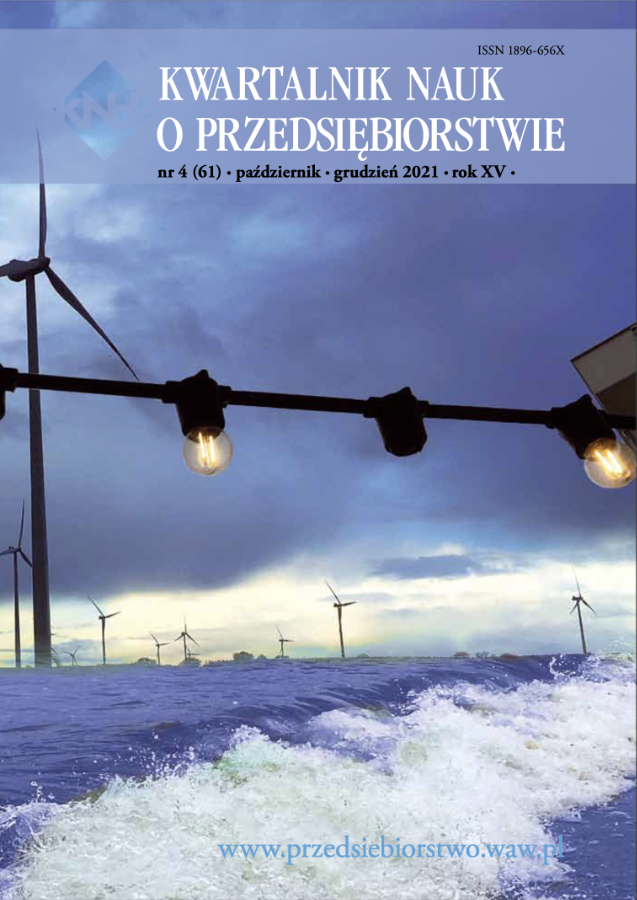Wpływ instytucji otoczenia biznesu na inicjowanie i prowadzenie działalności gospodarczej
Main Article Content
Abstrakt
Tworzenie odpowiednich warunków do prowadzenia działalności gospodarczej przez instytucje otoczenia biznesu może przyczynić się do ogólnego rozwoju gospodarczego poprzez przyciąganie nowych inwestycji i rozszerzanie już istniejących. Głównym celem badań była identyfikacja potencjalnych zmian dotyczących znaczenia instytucji otoczenia biznesu i ich wpływu na inicjowanie i prowadzenie działalności gospodarczej oraz ustalenie, czy zmiany te są istotne statystycznie. Z badań wynika, że zarówno przedstawiciele instytucji otoczenia biznesu jak i przedsiębiorcy uważają, że działania realizowane przez instytucje w czasie trwania badania nabrały większego znaczenia w porównaniu z okresem sprzed 10 i więcej lat. Ponadto, wpływ działań wdrażanych przez wszystkie wymienione w kwestionariuszu instytucje był statystycznie różny pomiędzy dwoma badanymi okresami.
Downloads
Article Details
Autor (Autorzy) artykułu oświadcza, że przesłane opracowanie nie narusza praw autorskich osób trzecich. Wyraża zgodę na poddanie artykułu procedurze recenzji oraz dokonanie zmian redakcyjnych. Przenosi nieodpłatnie na Oficynę Wydawniczą SGH autorskie prawa majątkowe do utworu na polach eksploatacji wymienionych w art. 50 Ustawy z dnia 4 lutego 1994 r. o prawie autorskim i prawach pokrewnych – pod warunkiem, że praca została zaakceptowana do publikacji i opublikowana.
Oficyna Wydawnicza SGH posiada autorskie prawa majątkowe do wszystkich treści czasopisma. Zamieszczenie tekstu artykuły w repozytorium, na stronie domowej autora lub na innej stronie jest dozwolone o ile nie wiąże się z pozyskiwaniem korzyści majątkowych, a tekst wyposażony będzie w informacje źródłowe (w tym również tytuł, rok, numer i adres internetowy czasopisma).
Osoby zainteresowane komercyjnym wykorzystaniem zawartości czasopisma proszone są o kontakt z Redakcją.
Bibliografia
2. Alvarez C., Urbano D., Coduras A., Ruiz-Navarro J. (2011), Environmental conditions and entrepreneurial activity: a regional comparison in Spain, “Journal of Small Business and Enterprise Development”, Vol. 18(1), pp. 120-140.
3. Baumol W. J., Strom R. J. (2007), Entrepreneurship and economic growth, “Strategic Entrepreneurship Journal”, Vol. 1(3-4), pp. 233-237.
4. Boettke P.J., Coyne C.J. (2009), Context matters: institutions and entrepreneurship, “Foundations and Trends Entrepreneurship”, Vol. 5 (3), pp. 135-209.
5. Braunerhjelm P., Acs Z.J., Audretsch D.B., Carlsson B. (2010), The missing link: knowledge diffusion and entrepreneurship in endogenous growth, “Small Business Economics”, Vol. 34, No. 2, pp. 105-125.
6. Davidson N., Mariev O. (2019), Factors Determining Enterprise Location Choice in Russia. In Proceedings of the 11th Economics & Finance Conference, International Institute of Social and Economic Sciences.
7. Duran Peralta J. (2019), Regional development and entrepreneurship: evidence for Colombia, “El trimestre economico”, Vol. 86, n. 342, pp. 467-490.
8. Escandon D., Urbano D., Hurtado-Ayala A. (2019), Exploring the Relationship between Formal and Informal Institutions, Social Capital and Entrepreneurial Activity in Developing and Developed Countries, ”Sustainability”, Vol. 11, pp. 1-20.
9. Fuentelsaz, L, González C., Maícas J.P., Montero J. (2015), How different formal institutions affect opportunity and necessity entrepreneurship, BRQ Business Research Quarterly, Vol. 18(4), pp. 246-258.
10. Godlewska M. (2019), Do interactions between formal and informal institutions matter for productive entrepreneurship? “Ekonomia i Prawo”, Vol. 18(1), p. 17-28.
11. Godlewska-Majkowska K. (2018), Investment Attractiveness of Polish Municipalities in Relation to Local Entrepreneurship, “Olsztyn Economic Journal”, Vol. 13(2), pp. 105-122.
12. Griffin R.W. (2015), Fundamentals of management, 8th ed., Cengage Learning: Boston, USA.
13. Knowles S., Weatherson C. (2006), ”Informal Institutions and Cross-Country Income Differences”, CREDIT Research Paper, University of Nottingham, No 06/06.
14. Kola M., Kujawka M., Kuzel M. (2005), Badanie uwarunkowań i skutków bezpośrednich inwestycji zagranicznych w województwie kujawsko-pomorskim, in: Bezpośrednie inwestycje zagraniczne w województwie kujawsko-pomorskim (stan, znaczenie dla gospodarki województwa, stymulanty i destymulanty napływu), (ed) Karaszewski W., Wydawnictwo UMK w Toruniu, Wydział Nauk Ekonomicznych i Zarządzania, Toruń, Poland, pp. 33-45.
15. Lisowska R. (2016), The Potential of Business Environment Institutions and the Support for the Development of Small and Medium-sized Enterprises, “Entrepreneurial Business and Economics Review”, Vol. 4(3), pp. 85-101.
16. Lizińska W., Marks-Bielska, R. Serocka I. (2014), Operations performed by business environment institutions in the process of foreign investment acquisition: a case study of investor service centres, “Equilibrium, Quarterly Journal of Economics and Economic Policy”, Vol. 9, Issue 4, pp. 65-78.
17. Marks-Bielska R. (2014), Factors Affecting Farmland Management in Poland in 1992-2012 in the Institutional Context (No. 35), Jelgava: Latvia University of Agriculture. International Scientific Conference Proceedings, 24-25 April 2014, pp. 189-198.
18. Paz R., Cabrer-Borrás B. (2019), Entrepreneurial capital and productive efficiency: the case of the Spanish regions, “Technological and Economic Development of Economy”, Vol. 25(6), pp. 1-17, 1363-1379.
19. Sobel R. (2008), Testing Baumol: Institutional quality and the productivity of entrepreneurship, “Journal of Business Venturing”, Vol. 23, pp. 641-655. doi:10.1016/j.jbusvent.2008.01.004
20. Urbano D., Alvarez C. (2014), Institutional dimensions and entrepreneurial activity: an international study, “ Small Business Economics”, 2014, Vol. 42(4), pp. 703-716.
21. Wennekers S., Thurik,R. (1999), Linking entrepreneurship and economic growth, “Small Business Economics”, Vol. 13(1), pp. 27-56.
22. Wierzbicka W. (2013), Quality of location in regions and economic efficiency of private companies in Poland, “Olsztyn Economic Journal”, 2013, Vol. 8, pp. 121-134.

